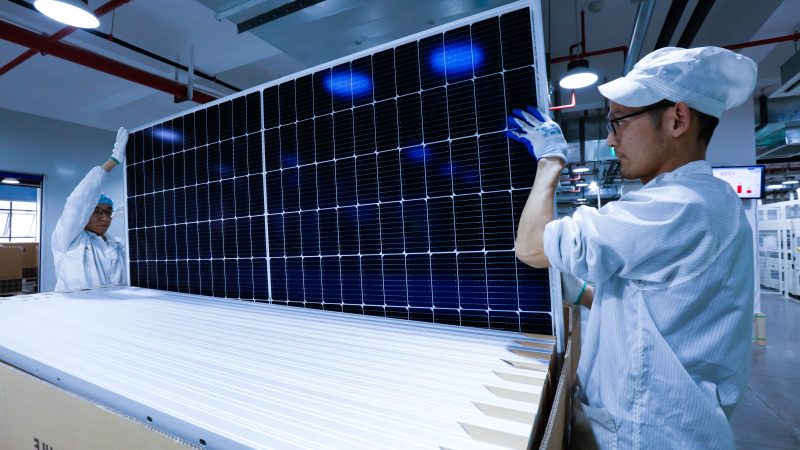The European Commission announced on Wednesday (3 April) that it had opened two anti-subsidy investigations against consortiums of solar companies involving subsidiaries of Chinese groups including LONGi, a giant in the sector.
The investigations focus on two separate consortia and are launched under the Foreign Subsidies Regulation, a set of rules that came into force last July to prevent subsidies from third countries suspected of creating unfair competition in EU tenders.
The European executive specifies that it is “will assess whether the companies concerned actually benefited from an unfair advantage in obtaining public contracts in the EU”.
“Two new in-depth investigations into foreign subsidies in the solar panel sector aim to preserve Europe’s economic security and competitiveness”Internal Market Commissioner Thierry Breton specified in a press release.
“Solar panels have gained strategic importance for Europe”he added.
The first consortium targeted by the investigation brings together the Romanian group Enevo and the German branch of the Chinese giant LONGi, a major global producer of photovoltaic cells.
The second consortium targeted by Brussels brings together two subsidiaries wholly controlled by the same Chinese public company, Shanghai Electric, under close supervision of the central government.
The investigations follow the requests of these two consortia for the design, construction and operation of a photovoltaic park in Romania with an installed capacity of 110 MW, partly financed by European funds.
European regulations require companies to notify Brussels of their participation in public tenders in the EU “whose estimated value exceeds 250 million euros”and whether they benefited from it“at least 4 million euros in foreign financial subsidies (…) for the previous three years”.
“After a preliminary examination of the bids, the Commission considered it justified to launch in-depth investigations as there is sufficient evidence to suggest that both (consortia) benefited from foreign subsidies distorting internal market conditions. at the expense of other candidate companies, Brussels emphasizes.
The commission, which has four months to decide, will be able to either give the green light, ban the identified companies from participating in Romania’s call for tenders, or take measures proposed by the groups to remedy the potential breach.
“Initiating an in-depth investigation does not prejudge the outcome of the investigation,” the European executive insists.
Already in mid-February, Brussels launched an investigation focused on a subsidiary of the Chinese railway manufacturer CRRC, the world number one in the field, a candidate for the supply and maintenance of electric trains in Bulgaria.
This was the first investigation launched under the new anti-subsidy regulations. CRRC, a publicly traded company, eventually withdrew from the tender at the end of March.
“We are deeply concerned about the successive in-depth investigations against Chinese companies”the Chinese Chamber of Commerce responded to the EU in a press release, adding that so far all three investigations have focused on Chinese companies.
“This situation distorts the conditions for Chinese companies in the EU,” added the association.
The import of solar panels from abroad is considered by Brussels to be essential for achieving the EU’s climate goals. In early March, European Energy Commissioner Kadri Simson downplayed the prospect of stiff tariffs on Chinese imports, while stressing that “support our industry” European.
(Edited by Anna Martino)


